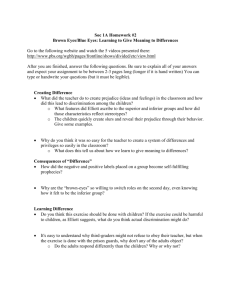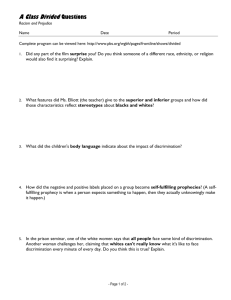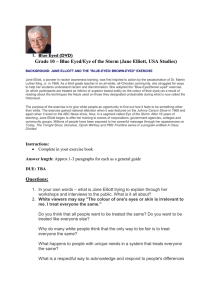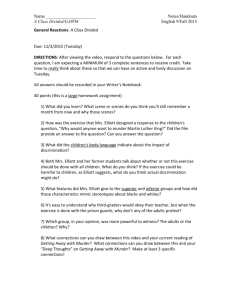Reading/Vocabulary 3 Test Chapter 5 Name: ________________
advertisement
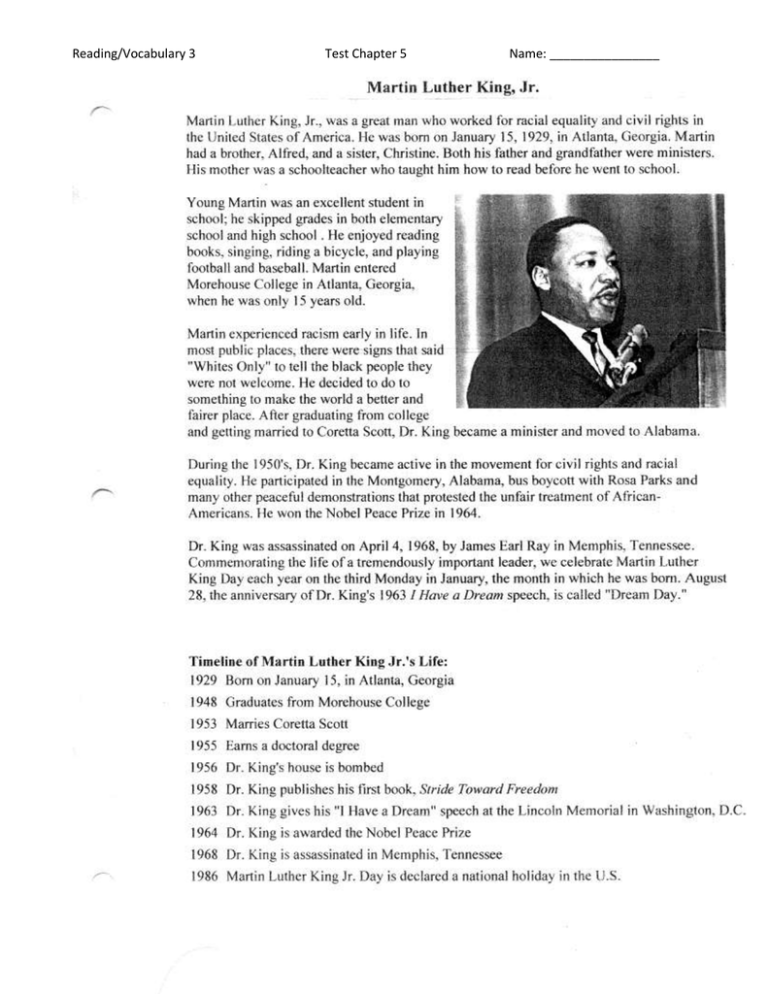
Reading/Vocabulary 3 Test Chapter 5 1 Name: ________________ Reading/Vocabulary 3 Test Chapter 5 Name: ________________ Reading 1 questions: 1. Which statement is NOT true? a) King gave his “I have a dream speech” at the Roosevelt Memorial. b) King was born on January 15, 1929. A. King attended Morehouse College in Atlanta. B. King earned a doctoral degree in 1955. 2. How many siblings did Martin Luther King have? a) one b) two c) three d) King had no siblings. 3. In paragraph 2 the passage says that King skipped grades. This suggests that: a) King enjoyed playing football and baseball. b) King learned how to skim and scan in reading class. c) King was very intelligent for his age. d) King dropped out of school to help his family. 4. Each year we celebrate Martin Luther King Day on: a) the anniversary of King’s “I Have a Dream Speech.” b) King’s birthday. c) August 28th. d) the third Monday in January. 2 Reading/Vocabulary 3 Test Chapter 5 Name: ________________ 5. Young Martin enjoyed playing: a) football and soccer. b) basketball and baseball. c) all sports. d) football and baseball. 6. What was Martin Luther King probably NOT worried about during the 1950s? a) civil rights b) racial equality c) peaceful demonstrations d) the Noble Prize 7. How old was Martin Luther King when he was killed: a) 37 b) 38 c) 39 d) 40 8. The passage implies or infers that King’s family background influenced his career because: a) His brother, Alfred, and sister, Christine, were students. b) Rosa Parks was a school teacher. c) Coretta Scott was a minister. d) King’s father and grandfather were ministers. 3 Reading/Vocabulary 3 Test Chapter 5 Name: ________________ 9. What happened between 1955 and 1969 that shows King’s life was at risk? a) King participated in the bus boycott, and he earned a doctoral degree. b) King’s house was bombed, and he was assassinated. c) King published his first book, and he was assassinated. d) King’s house was bombed, and he won the Nobel Peace Prize 10. What is the thesis statement (main idea statement) of this passage? a) Martin experienced racism early in life. b) Both King’s father and grandfather were ministers c) King’s mother taught him how to read before he ever attended school. d) King was a great man who worked for racial equality and civil rights. 4 Reading/Vocabulary 3 Test Chapter 5 Name: ________________ Reading 2 After more than 30 years since she first taught her eye-color exercise in discrimination to a third-grade class in Riceville, Iowa, Jane Elliott talked to a reporter about what she has learned over the years about the lesson's effect. This Web-exclusive interview was conducted on Dec. 19, 2002. http://www.pbs.org/wgbh/pages/frontline/shows/divided/etc/crusade.html (adapted 2/5/14) Reporter: What are you doing now? Are you still teaching your exercise? Jane Elliott: Yes, I'm still doing the exercise and giving lectures about its effects all over the U.S. and in several locations overseas. I've just recently spent five weeks in Scotland and England where I did the exercise with a group of diversity trainers and others interested in the topic of diversity. I delivered several lectures, or talks, about prejudice. Over the last 18 years I've given lectures in places such as Australia, Canada, Germany, the Netherlands, Northern Ireland, and Saudi Arabia. Reporter: What have you seen or learned after conducting your exercise in various parts of the world? Is discrimination a global problem? Jane Elliott: I've learned that discrimination and its effects are the same no matter where you live. I get the same results with the exercise in Berlin, Germany or in the Netherlands that I do in the U.S. or Australia or Curacao. And what's even more disturbing is the fact that I've gotten the same results using the exercise with adults in the year 2002 that I got using the exercise with children in Riceville, Iowa, in 1968. A number of years ago I did the exercise in Berlin, Germany. There was a woman in the brown-eyed group who did not want to do the exercise. So we had to vote on whether the group would only hear the lecture or do the exercise too. The group voted to do the exercise, and when it was over the woman had tears on her face. She said that she was very glad she had lost that vote. After doing the exercise, the woman felt that she had learned a lot and was a better person. 5 Reading/Vocabulary 3 Test Chapter 5 Name: ________________ 1. Why is the reporter talking to Jane Elliott? A. to find out more about the 3rd grade class in Riceville, Iowa B. to find out what Elliott has learned over the years about the lesson's effect C. to find out how all Elliott’s former students were doing since the reunion D. to find out about Elliott’s work with children and discrimination 2. What happened first according to the article? A. Thirty years before the interview Elliott did her exercise in Riceville. B. The interview was written in 2002. C. Jane Elliot recently returned from going overseas. D. Over the last 18 years Elliott gave lectures all over the world. Complete the summary with words or phrases from the box discrimination using disturbing useful on 1968 effects in 1968 discriminate Jane learned that (3) _________________ and its (4) _______________ are the same no matter where you live. She found that it was even more (3) __________________ that she got the same results (5) _________________ the exercise with adults in the year 2002 that she got using the exercise with children in Riceville, Iowa, (6) ___________. 6 Reading/Vocabulary 3 Test Chapter 5 Name: ________________ Answer the questions with YES=the sentence agrees with the information in the passage NO=the sentence does not agree with the information in the passage NOT GIVEN=the information in the sentence is not found in the passage 7. Elliott spent five weeks in Scotland and England where she did the exercise with diversity trainers. ________ 8. A woman in Berlin, Germany was angry after she finished the exercise on discrimination. ________ 9. Jane Elliott decided to stop doing her work on teaching tolerance 2 years ago. _________ 10. Jane Elliott no longer lives in Riceville, Iowa. _________ 7 Reading/Vocabulary 3 Test Chapter 5 Name: ________________ Vocabulary Section: 1. The ___________________ of discrimination is not easily forgotten. A. vicious B. agony C. privileges D. humiliated 2. The students who were told that they were doing great work did _____________________ better on their tests. A. consistently B. thoughtful C. very much D. in contrast 3. If a group of people made fun of your physical appearance you may feel ____________________. A. agonizing B. eager C. impact D. humiliated 4. Another word for considerate or kind is _________________________. A. inferior 8 Reading/Vocabulary 3 Test Chapter 5 Name: ________________ B. tolerant C. thoughtful D. diversity 5. What is an antonym of superior? A. advantage B. better than C. inferior D. privileged Fill in the blank with the correct word from the list below: vicious discrimination tolerant astonished diversity 6. The racist man’s _____________________ words hurt the feelings of the young girl. 7. I was _______________________ by the strength and power of Martin Luther King’s words. 8. __________________________ is a danger to freedom and equality. 9. __________________________ is good because having lots of different viewpoints makes life more interesting. 10. I was more ___________________________ of other people’s opinions after reading Martin Luther King’s book, “Strength to Love”. 9
